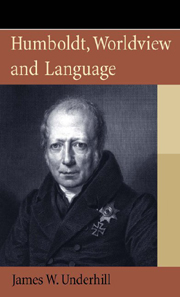Book contents
- Frontmatter
- Contents
- Acknowledgements
- Preface
- Part I Language and World
- Part II Humboldt, Man and Language
- 7 Worldview (Weltanschauung or Weltansicht)
- 8 Sprache
- 9 The Work of the Mind
- 10 Form
- 11 Creativity, Culture and Character
- 12 Catching the Character
- 13 A Seeing and Feeling Worldview
- 14 Four Dangers in the Comparative Approach
- 15 Reformulating the Worldview Hypothesis World
- 16 A Final Word
- Glossary
- Bibliography
- Index
8 - Sprache
from Part II - Humboldt, Man and Language
Published online by Cambridge University Press: 12 September 2012
- Frontmatter
- Contents
- Acknowledgements
- Preface
- Part I Language and World
- Part II Humboldt, Man and Language
- 7 Worldview (Weltanschauung or Weltansicht)
- 8 Sprache
- 9 The Work of the Mind
- 10 Form
- 11 Creativity, Culture and Character
- 12 Catching the Character
- 13 A Seeing and Feeling Worldview
- 14 Four Dangers in the Comparative Approach
- 15 Reformulating the Worldview Hypothesis World
- 16 A Final Word
- Glossary
- Bibliography
- Index
Summary
Before examining more fully the concept of Weltansicht as it appears in Humboldt's work, we should first try to grasp the innovative conception of language that Humboldt worked with. Humboldt spoke of language (Sprache) in very vivid organic terms: and this was not simply a stylistic flourish. On the contrary, the organic imagery with which he thought of language and with which he sought to disentangle himself from other organic and inorganic metaphoric representations of language, were part of his conception of the faculty of speech as the formative organ of thought. The two main representations of language from which Humboldt was trying to liberate himself were those of the vehicle model and the mirror model of language. For most philosophers of the Enlightenment (and Humboldt remained in many respects a proponent of the Enlightenment project which sought to discover the nature of man), language was considered to be the creation of human Reason. It may be a necessary outward vehicle, philosophers supposed, for Reason's more complex operations, but it remained subordinate to Reason (Langham Brown 1967: 58). The German Enlightenment philosopher, Leibniz (1646–1716), a major influence on Humboldt, went so far as to suggest that words could ‘help our own thoughts’ (ibid.), but he conceived language basically as ‘the mirror of the intellect’ (57). Language reflects thought, it was argued. The anthropologist, Franz Boas, two hundred years later, was working with very much the same idea when he investigated the way the language of the Amerindians revealed their culture.
- Type
- Chapter
- Information
- Humboldt Worldview and Language , pp. 58 - 62Publisher: Edinburgh University PressPrint publication year: 2009



